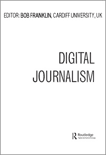
Digital Journalism
Scope & Guideline
Championing Interdisciplinary Perspectives in Journalism Studies
Introduction
Aims and Scopes
- Digital Transformation in Journalism:
Research on how digital technologies are reshaping journalistic practices, including the adoption of new tools, workflows, and business models. - Audience Engagement and Interaction:
Exploring the dynamics of audience interaction with news content, including social media engagement, news sharing behaviors, and the impact of audience data on journalistic practices. - Ethics and Responsibility in Digital Journalism:
Investigating the ethical implications of digital journalism, including issues related to misinformation, algorithmic bias, and the responsibilities of journalists in the digital space. - Alternative and Participatory Media:
Examining the roles of alternative media and participatory journalism in shaping public discourse, with a focus on community engagement and grassroots reporting. - Impact of Algorithms and AI on Journalism:
Analyzing how algorithms and artificial intelligence influence news production, distribution, and consumption, including the implications for journalistic integrity and diversity. - Crisis and Resilience in Journalism:
Understanding how journalism adapts to crises, such as the COVID-19 pandemic, and the strategies employed for survival and innovation in challenging contexts.
Trending and Emerging
- Mental Health and Well-Being of Journalists:
Increasing attention is being paid to the mental health challenges faced by journalists, particularly in digital newsrooms, emphasizing the need for supportive organizational structures. - Algorithmic Accountability and Transparency:
Research is trending towards understanding the implications of algorithms in news distribution, focusing on accountability, transparency, and the ethical considerations surrounding their use. - Visual Journalism and AI Integration:
There is a growing exploration of how visual storytelling and artificial intelligence intersect in journalism, reflecting the importance of visual communication in digital news. - Misinformation and Fact-Checking:
The rise of misinformation in the digital age has led to increased scholarly interest in fact-checking practices, audience perceptions, and the role of journalists in combating false information. - Participatory Journalism and Community Engagement:
Emerging research focuses on participatory journalism as a means of fostering community engagement and empowering citizens in the news-making process. - Data-Driven Journalism:
The integration of data analytics into journalism is gaining traction, with studies examining how data is used to enhance storytelling, inform editorial decisions, and engage audiences.
Declining or Waning
- Traditional Journalism Models:
There seems to be a decline in research focused on traditional journalistic models and practices, as the emphasis shifts towards digital-first strategies and the impact of technology on news. - Print Journalism Studies:
With the growing focus on digital platforms, studies specifically centered on print journalism are becoming less frequent, reflecting the industry's transition towards digital mediums. - Crisis Reporting in Conventional Contexts:
Research on crisis reporting that does not account for the digital landscape is waning, as scholars focus more on how digital tools and platforms influence crisis journalism. - Static Audience Research:
Studies that treat audiences as passive consumers of news are declining, with a shift towards understanding audience agency and interaction in the digital environment. - Local Journalism Challenges in Isolation:
Research addressing local journalism challenges is increasingly contextualized within broader digital transformations, leading to a decrease in studies focusing solely on local issues without considering digital influences.
Similar Journals

Central European Journal of Communication
Fostering Insightful Dialogue in Communication StudiesCentral European Journal of Communication, published by the Polish Communication Association, is a pivotal resource in the field of communication studies. Since its inception, this journal has become a significant platform for scholarly discourse, contributing valuable research and insights that span the diverse landscape of communication. With its current classification in the Q3 quartile of the communication category and a ranking of #315 out of 511 in Scopus, it is positioned to foster growth in communication research and practice within Central Europe and beyond. The journal invites submissions that explore a wide array of topics pertinent to communication, ensuring a robust dialogue among researchers, professionals, and students alike. Although currently operating under traditional access formats, the journal aims to enhance visibility and engagement by prioritizing quality content that addresses contemporary issues in communication, making it an essential resource for those looking to deepen their understanding of this dynamic field.
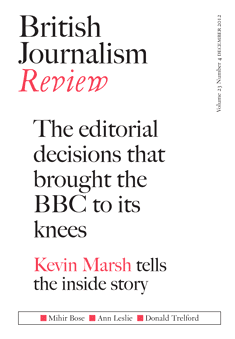
British Journalism Review
Connecting Scholars and Practitioners in MediaBritish Journalism Review is a distinguished academic journal dedicated to the exploration and analysis of the rapidly evolving field of journalism. Published by SAGE Publications Ltd, this journal plays a critical role in disseminating high-quality research that addresses key issues facing journalists and media organizations today. With an ISSN of 0956-4748 and an E-ISSN of 1741-2668, it is a pivotal resource for scholars, practitioners, and students alike. Although the journal does not currently offer Open Access options, it maintains a strong commitment to academic rigor and innovation in journalism studies. By engaging with a diverse range of topics such as media ethics, the impact of digital technologies, and the changing landscape of news consumption, the British Journalism Review remains instrumental in shaping contemporary debates and enhancing the scholarly discourse in its field.

Doxa Comunicacion
Exploring the forefront of communication research.Doxa Comunicación is a prominent open-access journal dedicated to advancing the field of communication studies, published by Universidad San Pablo CEU, under the Faculty of Humanities and Communication Sciences. Established in 2003, this journal has gained recognition for its commitment to disseminating high-quality research and thought-provoking articles, fostering a vibrant academic community. With an ISSN of 1696-019X and an E-ISSN of 2386-3978, Doxa Comunicación occupies a vital niche in the academic landscape of Spain, contributing to both national and international discourses. In the 2023 rankings, it is categorized in the Q3 quartile within the fields of Communication and Social Sciences (miscellaneous), reflecting its competitive standing among peer publications. The journal's diverse scope, including contemporary communication theories and practices, ensures relevance for researchers, professionals, and students alike. With a Scopus rank of #333 in Social Sciences (miscellaneous) and #291 in Communication, Doxa Comunicación serves as an essential platform for innovative research that addresses the complex challenges of modern communication in a rapidly evolving society.
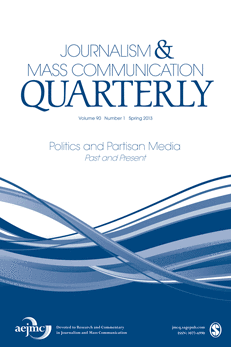
JOURNALISM & MASS COMMUNICATION QUARTERLY
Connecting scholars to the heart of mass communication.JOURNALISM & MASS COMMUNICATION QUARTERLY, published by SAGE PUBLICATIONS INC, stands as a premier platform for scholarly discourse in the fields of journalism and mass communication. With an impressive Q1 ranking in the Communication category for 2023, this journal serves as an essential resource for researchers, professionals, and students seeking in-depth analysis and insights into contemporary media landscape challenges and evolutions. Its comprehensive scope, encompassing studies from as early as 1955 through 2024, provides a rich repository of historical and current research, ensuring a continuous dialogue about the impacts of media on society. Although not an Open Access journal, it remains highly regarded, evidenced by its Scopus rank of #41 out of 511 in the Communication field and a remarkable 92nd percentile ranking. As a critical resource, it contributes significantly to advancing academic knowledge and practical applications in journalism and mass communication.
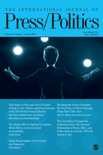
International Journal of Press-Politics
Championing Scholarly Excellence in the Press-Politics SphereThe International Journal of Press-Politics, published by SAGE Publications Inc, stands as a premier scholarly platform at the intersection of communication, sociology, and political science. With a distinguished history dating back to its inception in 2003 and maintaining its relevance through 2024, this journal is recognized in the academic community for its rigorous exploration of the dynamics between the media and political processes. The journal proudly holds a Q1 ranking in both Communication and Sociology and Political Science categories, placing it in the top tier of its field, underscored by its impressive Scopus rankings, which reflect its global influence and reach. With an intention to foster innovative research and discourse, IJPP is committed to being accessible, contributing significantly to the understanding of how press and politics shape societal narratives, thus serving as an essential resource for researchers, professionals, and students alike. Explore this esteemed journal to engage with cutting-edge studies that drive the field forward.
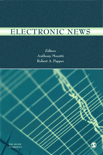
Electronic News
Advancing Knowledge at the Intersection of Communication and Innovation.Electronic News, published by SAGE PUBLICATIONS INC, stands at the forefront of scholarly communication, focused on the dynamic intersection of media, technology, and society. With an ISSN of 1931-2431 and an E-ISSN of 1931-244X, this journal has established itself as a valuable resource for academics and professionals alike, exploring critical themes in communication and information systems. Operating from its base in the United States, Electronic News operates within a competitive landscape, boasting a commendable Q2 ranking in Communication and a Q3 ranking in Information Systems. This reflects its commitment to high-quality research and impactful insights, as evidenced by its Scopus rankings, where it ranks #238 out of 511 in Social Sciences Communication and #302 out of 394 in Computer Science Information Systems. Although currently embracing a traditional subscription model, the journal serves as a crucial platform for disseminating knowledge that shapes the future of news and media in a rapidly evolving digital age. As it converges from 2009 to 2024, Electronic News continues to invite contributions that address the multifaceted challenges and innovations of news media, making it an essential resource for researchers, practitioners, and students eager to engage with contemporary issues in communication.
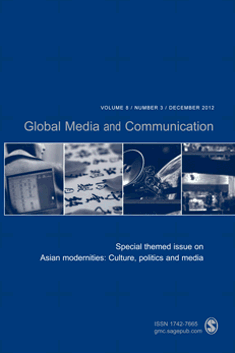
Global Media and Communication
Transforming Perspectives on Communication in a Digital AgeGlobal Media and Communication is a premier journal dedicated to advancing the fields of media and communication studies, published by SAGE Publications Ltd. With an ISSN of 1742-7665 and an E-ISSN of 1742-7673, this journal offers a platform for scholarly discourse and innovative research that explores the intricate relationships between global media practices and communication strategies. Recognized as a Q1 journal in both the Arts and Humanities (Miscellaneous) and Communication categories for 2023, it stands out in its commitment to delivering high-quality, peer-reviewed articles that contribute to the understanding of contemporary media landscapes. Located in London, United Kingdom, the journal benefits from being at the heart of cultural and digital innovation. Researchers, professionals, and students can look forward to insightful articles that not only critique existing frameworks but also propose new methodologies, ensuring that Global Media and Communication remains a vital resource for anyone interested in navigating the evolving dynamics of media and communication on a global scale.
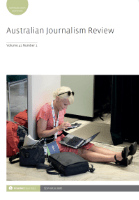
Australian Journalism Review
Shaping the Future of Journalism StudiesAustralian Journalism Review, published by INTELLECT LTD, is a leading academic journal that focuses on the dynamic field of journalism and communication. With the ISSN 0810-2686 and E-ISSN 2517-620X, this journal has established itself as a significant contributor to understanding contemporary journalism in Australia and beyond. It boasts a respectable Q2 ranking in the Communication category for 2023, positioning it among the top journals in its field, with a Scopus rank of #273 out of 511 in Social Sciences Communication, reflecting its growing impact within academic and professional circles. The journal’s scope includes critical analyses of journalism practices, media policy, and the evolving roles of journalists in society, making it an essential resource for researchers, professionals, and students interested in the intersection of media, ethics, and culture. Although it does not currently offer open access, interested audiences can find valuable insights from its converged issues, spanning from 2003 to 2024, allowing for a comprehensive view of the progression and transformation of journalism studies.

Pacific Journalism Review
Exploring Innovative Narratives from the Pacific Region.The Pacific Journalism Review, published by the Auckland University of Technology’s Creative Industries Research Institute, stands as a pivotal platform for scholarly discourse in the field of journalism and communication, particularly within the Pacific region. With an ISSN of 1023-9499 and an E-ISSN of 2324-2035, this journal has embraced Open Access since 2016, thereby enhancing accessibility and dissemination of research findings. Located in Auckland, New Zealand, it has been a critical outlet for innovative research and analysis from 2005, converging onto the contemporary landscapes of media practices through 2024. Featuring a 2023 Scopus ranking of #211 in the field of Communication, placing it in the 58th percentile, this journal is recognized for its significant contributions to the academic community, evident from its classification in the Q3 quartile. Aimed at researchers, professionals, and students alike, the Pacific Journalism Review not only enriches the discourse in communication studies but also shapes the future narratives of journalism in the Pacific and beyond.
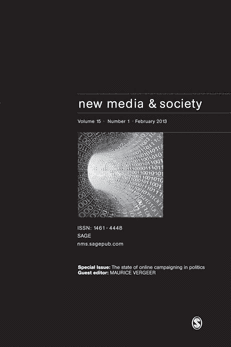
NEW MEDIA & SOCIETY
Exploring the Nexus of Digital Interaction and SocietyNEW MEDIA & SOCIETY is a leading academic journal published by SAGE PUBLICATIONS LTD, specializing in the dynamic interplay between new media and its impact on society. Established in 1999, the journal has become a vital resource for researchers and professionals within the fields of communication, sociology, and political science, consistently ranking in the first quartile (Q1) of its categories according to the 2023 Scopus Rankings. With an impressive percentile of 98th in both communication and sociology disciplines, NEW MEDIA & SOCIETY provides a platform for cutting-edge research that explores the complexities of digital interaction and its societal implications. Although the journal is not open access, it remains accessible through various academic institutions, making it an essential reference for students and scholars aiming to engage with the latest advancements in new media research. As the journal converges its focus into 2024, it aims to foster interdisciplinary dialogue and innovation, addressing critical issues related to digital technologies and their role in shaping contemporary society.